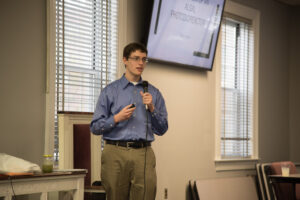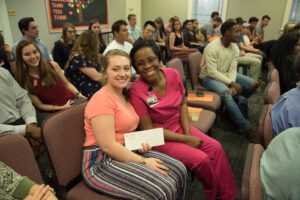When second-year law student Connor Purks learned about the problems faced by low-income citizens who need help with a civil court case, he knew there had to be a solution.
Purks and his team designed a Legal Self Help Chatbot that provides free civil legal aid round-the-clock. He demonstrated their beta version at Wednesday night’s Innovation Challenge, a Business Week event where students pitched problem-solving ideas and prototypes to a judging panel of entrepreneurs. With one tap, users begin a question and answer process that ultimately narrows down what information they’ll need to make their case.
“The idea is that Chatbot will ask simple questions and provide the right documentation so people can represent themselves in court free of charge,” said Purks. “This is the future of law, because legal services can be expensive and charge based on time.”
One great advantage to Purks’ Chatbot is that it can help users cut down on consultation time — time spent explaining the nature of the case that can rack up fees. With the help of Chatbot, users can at least cut costs by coming to lawyers prepared.
Purks’ prototype demonstration kicked off the first annual Innovation Challenge, where 17 teams of students represented nine different majors across six schools at Campbell. Following Legal Chatbot was a presentation from chemical engineering student William Strater on a topic that started as an unusual hobby: farming algae.

“I started on my own, but Dr. Matthews in the sciences was actually interested in this idea of mine,” Strater said, sounding surprised. “If you live near any plantations that have their own waterholes, you’ve seen algae. But it probably never occured to you to think about how it grows.”
Strater brought a sample of the strain of algae he expected to grow and walked his Taylor Hall audience through models of the tubular photobioreactor he built. He explained that apart from growing incredibly fast without much stimulation, algae is a great source of protein, although the jury is still out on its taste. Strater hopes to sell his algae to be used in nutritional supplements, but has also considered using it in 3-D printing, which already uses inks containing live bacteria to produce objects with different properties.
Making a sudden leap from artificial intelligence that provides legal aid to an algae-farming model was not unusual at the pitch competition. Students presented on a huge variety of subjects, from recycling on campus to a new and improved fish hook and the introduction of a Campbell University mobile app.
Dean O’Mara reminded the audience that project diversity was expected, considering that the purpose of Innovation Challenge was simply to use creativity to try to solve a problem, no matter how big or small.
“It’s so good to see so many majors represented tonight,” said the dean, “because tonight we’re looking for the same thing that companies and organizations look for. Now the key is not what you know, because you can google anything … it’s whether or not you can be innovative.”

The three winners listed below received $100 gift cards to Barnes and Noble and lunch with President Creed:
- Maggie Warren (Business Administration, Business School), for her project to bring color and creativity to schools such as Buies Creek Elementary.
- Erica Thomas (Nursing School), for her project to improve mental health services on campus.
- Morgan Dailey (Masters of Public Health, College of Pharmacy & Health Sciences), for her project to produce multimedia content for patient education in waiting rooms and online.
As he congratulated the winners, faculty member Scott Kelly was already looking forward to next year’s event.
“We have an opportunity at Campbell to help students start leading with purpose now,” he said. “Students gain insights to different areas as they tackle relevant problems, build prototypes, and get feedback from the community.”

